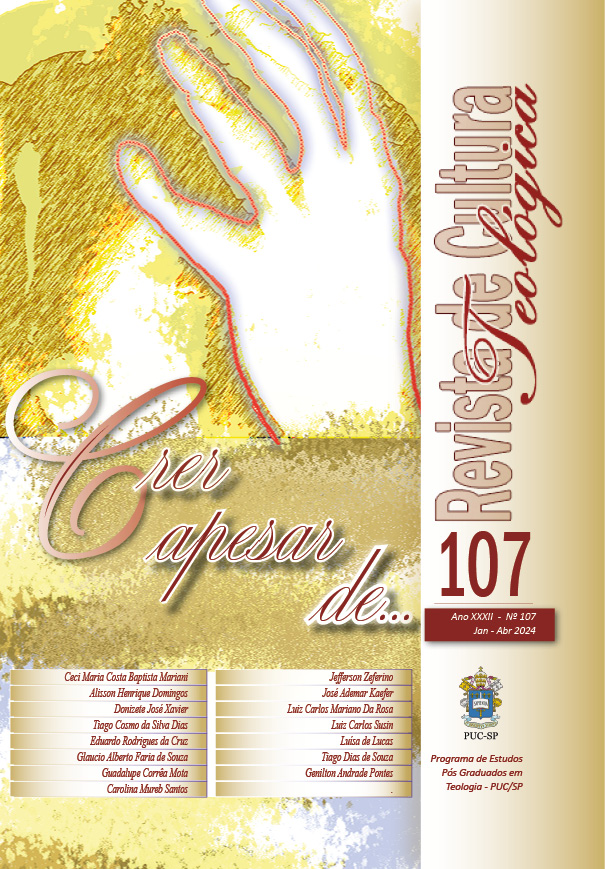Mary and human dignity
Reflections on Mariology, Ecclesiology and Anthropology in Augustine
DOI:
https://doi.org/10.23925/rct.i107.65985Keywords:
Patristic Mariology, History of Mariolog, Augustinian AnthropologyAbstract
The theological, anthropological and spiritual heritage that Patristics offers about Mary, mother of Jesus, is extremely rich. Anthropology, as a science that investigates the origins and characteristics of human beings, also directs theology from the perspective of understanding the foundation of human dignity that is inherent to Christian life. The theological anthropology elaborated by Augustine of Hippo on Mary is related to the elaboration of Christological and Trinitarian dogmas and his thoughts on the Church. The present article aims to show how Augustine applies the term person and human dignity, from the figure of Mary and her typological relationship with the Church, focusing on the plan of Salvation in Christ through the Trinity. Throughout his works, Augustine lists some attributions to the Church, associating them several times with the Mother of the Lord, thus testifying to a deeply Christocentric thought and to both an ecclesiological Mariology and a mariological ecclesiology. Augustine emphasizes the exceptional dignity of Mary, the only one to be at same time virgin and mother, not only in spirit but also in his body.
References
AGOSTINHO, Santo. A Virgem Maria: cem textos marianos com comentários. Tradução: Nair de Assis Oliveira. São Paulo: Paulus, 1996.
AGOSTINHO, Santo., Bispo de Hipona, 354-430. A Graça (II) / Santo Agostinho; [tradução Agustinho Belmonte]. São Paulo: Paulus, 1999. – (Coleção Patrística 13).
AGOSTINHO, Santo. A Virgindade Consagrada. (trad. Nair Oliveira). Paulus: São Paulo, 1990.
AGOSTINHO. A Natureza do Bem: o castigo e o perdão dos pecados, o batismo das crianças. São Paulo: Paulus, 2019.
AGOSTINHO. A Trindade. Trad. Agustino Belmonte. São Paulo: Paulus, 1994.
BÍBLIA DE JERUSALÉM. 3 impr. São Paulo: Paulinas, 1987.
CAFFARRA, Carlo. La persona umana: aspetti teologici. Disponível em: <http://www.caffarra.it/personau_96.php>. Acesso em10.dez.2023.
CATECISMO da Igreja Católica. Petrópolis: Vozes; São Paulo: Loyola, 1993.
COSTA, Lourenço. (Org.). Documentos do Concílio Ecumênico Vaticano II (1962-1965): Constituição Dogmática Dei Verbum, sobre a revelação divina. São Paulo: Paulus, 2007, p. 347-367.
COSTA, Lourenço. (Org.). Documentos do Concílio Ecumênico Vaticano II (1962-1965): Constituição Dogmática Lumen Gentium, sobre a Igreja. São Paulo: Paulus, 2007, p. 101-197.
COSTA, Lourenço. (Org.). Documentos do Concílio Ecumênico Vaticano II (1962-1965): Constituição Pastoral Gaudium et Spes sobre a Igreja no mundo de hoje. São Paulo: Paulus, 2007, p. 539-661.
GOMES, Cirilo Folch. A doutrina da Trindade Eterna: o significado da expressão “três pessoas”. Rio de Janeiro: Lumen Christi, 1979a.
JOÃO PAULO II. Carta Encíclica Evangelium Vitae: sobre o valor e a inviolabilidade da vida humana. Disponível em:< https://www.vatican.va/content/john-paul-ii/pt/encyclicals/documents/hf_jp-ii_enc_25031995_evangelium-vitae.html>. Acesso em 11 dez. 2023.
JOHNSON, Elisabeth. A. Nossa Verdadeira Irmã: Teologia de Maria na comunhão dos santos. São Paulo: Edições Loyola, 2006.
MURAD, Afonso. Maria, toda de Deus e tão humana: Compêndio de Mariologia. São Paulo: Paulinas, 2012.
GARCIA PAREDES, José Cristo Rey. Mariologia: síntese bíblica, histórica e sitemática. Tradução de José Joaquim Sobral. São Paulo: Editora Ave-Maria, 2011.
PINTO, Rafael Augusto Linhares. Compêndio de Mariologia. São Paulo: Cultor de Livros, 2018. p.311. (SCOTUS, João Duns. Ordinatio3, d.3,q.1.).
SÖLL, G. I. Maria. In: DI BERARDINO, Angelo (Org.). Dicionário Patrístico e de Antiguidades Cristãs. Petrópolis: Vozes, 2002.
SUSIN, Luiz Carlos. Maria na história da teologia. Teocomunicação, v. 81, n. 3, p. 267-277, jan./jun, 1988.
Published
How to Cite
Issue
Section
License
Copyright (c) 2024 Revista de Cultura Teológica

This work is licensed under a Creative Commons Attribution-NonCommercial-NoDerivatives 4.0 International License.
Os autores concedem à revista todos os direitos autorais referentes aos trabalhos publicados. Os conceitos emitidos em artigos assinados são de absoluta e exclusiva responsabilidade de seus autores.

